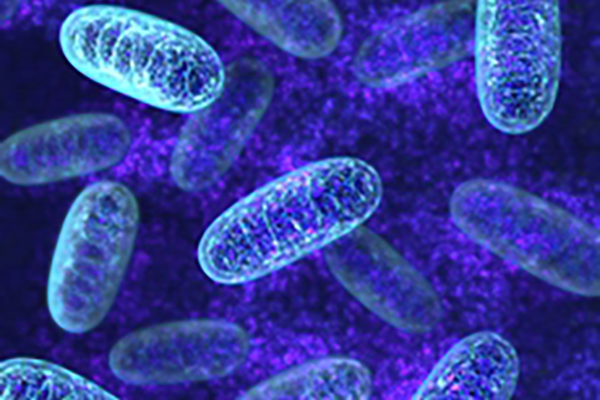(image from medlineplus.gov)
Over the last five or ten years there has been a huge increase in the amount of research looking at mitochondria and the role these little engines play in our overall health.
Mitochondria are small structures inside our cells that convert food and oxygen into energy in the form of adenosine triphosphate (ATP). Some cells have only a few mitochondria while others can have several thousand. A large amount of ATP must be produced by the mitochondria every second of every day because it cannot be stored.
When it comes to protecting your mitochondria, your food choices matter. Keep your mitochondria moving with these strategies. #energy #saslife Share on XMaking + using mitochondria
The production of ATP is a complex process, and mitochondria are especially susceptible to nutrient deficiencies, environmental toxins and oxidative damage. Although many nutrients are necessary for ATP production, some of the most important ones are B vitamins, selenium, carnitine, CoQ10, iron, magnesium, manganese and glutathione.
Producing ATP isn’t the only thing mitochondria do, they play a role in everything from iron and calcium homeostasis to the production of hormones and neurotransmitters like serotonin and melatonin. There is also evidence that they influence and are influenced by our gut microbiota and immune system.
Mitochondria contribute to the growth, differentiation and death of cells throughout the body, and that’s why mitochondrial dysfunction is associated with most age-related disorders, as well as common chronic diseases such as type 2 diabetes, heart disease, neurodegenerative diseases, chronic pain and chronic fatigue.
How to keep mitochondria going!
Our food choices can affect the number and function of our mitochondria. In order to support healthy mitochondrial function, we want to eat in a way that provides all the necessary nutrients while limiting or avoiding foods or compounds that are detrimental to mitochondrial health.
Sources of mitochondrial dysfunction
- Excess sugar and processed carbohydrates - creates too much oxidative stress which damages mitochondria
- Overeating – it’s like flooding the engine
- Unhealthy fats – like trans fats, oxidized oils from deep drying or highly processed food
- Alcohol
- Micronutrient deficiencies
- Environmental toxins – like pesticides, organochlorines, organophosphates, BPA, mercury, lead, POP’s, etc.
Supporting mitochondria
Studies have found that eating a Mediterranean style diet, essentially an anti-inflammatory diet that is high in phytonutrients and omega-3 fatty acids, can not only increase the amount of mitochondria, but also support optimal functioning of the mitochondria.
Muscle is where we have the most mitochondria. Therefore, a diet or lifestyle that causes muscle loss (being inactive, inadequate protein intake, high sugar, high processed carbs) leaves us with fewer, poor functioning mitochondria. Our bodies are meant to move, and we need the dietary protein to support our muscles. We especially need more and higher-quality protein as we age.
Fasting and has also been shown to be supportive of healthy mitochondrial function and can trigger mitochondrial biogenesis (creation of more mitochondria). A 12-hour overnight fast is typically safe for most. Anything longer than this, please talk to your health care provider, especially if you have any medical issues or take any medications.
Here are some ways you can support mitochondria production and function:
- Boost phytonutrient intake: Aim for 8-10 servings of a colorful variety of fruits and vegetables each day and incorporate lots of herbs and spices in your meals.
- Increase intake of omega-3 rich fatty fish: Aim for at least 2-3 servings of salmon, sardines, mackerel and herring per week.
- Ensure adequate protein intake: Most adults need at least 25-30g of protein per meal.
- Limit or avoid alcohol: Alcohol is a toxin and directly impairs mitochondrial function.
- Limit excess sugar and highly processed foods: Enjoy a variety of minimally processed, nutrient dense foods.
Bottom Line
When it comes to protecting your mitochondria, your food choices matter. Start with a nutrient-dense whole foods based plan, and talk to your dietitian/nutritionist to see what else you can do to prevent mitochondrial dysfunction.
Saag Coconut Chicken
Recipe adapted from: The Living Kitchen Cookbook
Makes 4 servings
PRINT RECIPE
Ingredients
1 Tbsp coconut oil or ghee
½ cup diced onion
3 cloves garlic, minced
2 tsp minced ginger root
1 tsp turmeric
1 tsp cumin
1 tsp coriander
1 tsp garam masala
½ tsp sea salt
Pinch of pepper
2 cups baby spinach
1 cup baby kale
½ cup cilantro, chopped
14oz can full-fat coconut milk
1 tsp coconut oil or ghee
4-6 chicken thighs
Instructions:
- Heat coconut oil in a wide pan over medium heat. Add onions and sauté for 5 minutes. Add garlic, ginger, spices, salt and pepper and sauté for another minute.
- Add spinach, kale and cilantro, stirring to make sure all the greens are coated in the spices.
- Pour in coconut milk. Simmer for 5 minutes.
- Take off the heat, then carefully puree in a food processor until the mixture is perfectly smooth. If you don’t have a food processor, use a regular blender, or even a hand blender.
- Without washing out the pan, add 1 tsp of coconut oil to the pan and sear chicken for 5 minutes per side.
- Add the blended green mixture back to the pan, cover, and simmer for 30 minutes, or until the chicken is cooked through and has an internal temperature of 165ºF.




